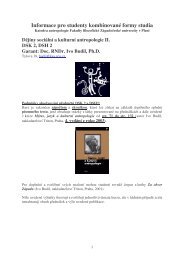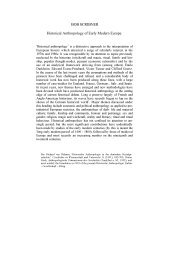The Revival of Narrative: Reflections on a New Old History ...
The Revival of Narrative: Reflections on a New Old History ...
The Revival of Narrative: Reflections on a New Old History ...
You also want an ePaper? Increase the reach of your titles
YUMPU automatically turns print PDFs into web optimized ePapers that Google loves.
THE REVIVAL OF NARRATIVE 9Many historians now believe that the culture <str<strong>on</strong>g>of</str<strong>on</strong>g> the group, and eventhe will <str<strong>on</strong>g>of</str<strong>on</strong>g> the individual, are potentially at least as important causalagents <str<strong>on</strong>g>of</str<strong>on</strong>g> change as the impers<strong>on</strong>al forces <str<strong>on</strong>g>of</str<strong>on</strong>g> material output anddemographic growth. <str<strong>on</strong>g>The</str<strong>on</strong>g>re is no theoretical reas<strong>on</strong> why the lattershould always dictate the former, rather than vice versa, and indeedevidence is piling up <str<strong>on</strong>g>of</str<strong>on</strong>g> examples to the ~<strong>on</strong>trary.~ C<strong>on</strong>tracepti<strong>on</strong>, forexample, is clearly as much a product <str<strong>on</strong>g>of</str<strong>on</strong>g> a state <str<strong>on</strong>g>of</str<strong>on</strong>g> mind as it is <str<strong>on</strong>g>of</str<strong>on</strong>g>ec<strong>on</strong>omic circumstances. <str<strong>on</strong>g>The</str<strong>on</strong>g> ro<str<strong>on</strong>g>of</str<strong>on</strong>g> <str<strong>on</strong>g>of</str<strong>on</strong>g> this c<strong>on</strong>tenti<strong>on</strong> can be found inthe wide diffusi<strong>on</strong> <str<strong>on</strong>g>of</str<strong>on</strong>g> this praciice throughout France, l<strong>on</strong>g before industrializati<strong>on</strong>,without much populati<strong>on</strong> pressure except <strong>on</strong> smallfarms, and nearly a century before any other western country. We als<strong>on</strong>ow know that the nuclear family antedated industrial society, andthat c<strong>on</strong>cepts <str<strong>on</strong>g>of</str<strong>on</strong>g> privacy, love and individualism similarly emergedam<strong>on</strong>g some <str<strong>on</strong>g>of</str<strong>on</strong>g> the most traditi<strong>on</strong>al sectors <str<strong>on</strong>g>of</str<strong>on</strong>g> a traditi<strong>on</strong>al society inlate seventeenth- and early eighteenth-century England, rather thanas a result <str<strong>on</strong>g>of</str<strong>on</strong>g> later modernizing ec<strong>on</strong>omic and social processes. <str<strong>on</strong>g>The</str<strong>on</strong>g>Puritan ethic was a by-product <str<strong>on</strong>g>of</str<strong>on</strong>g> an unworldly religious movementwhich took root in the Anglo-Sax<strong>on</strong> societies <str<strong>on</strong>g>of</str<strong>on</strong>g> England and <strong>New</strong>England centuries before routine work-patterns were necessary or thefirst factory was built. On the other hand there is an inverse correlati<strong>on</strong>,at any rate in nineteenth-century France, between literacy andurbanizati<strong>on</strong> and industrializati<strong>on</strong>. Levels <str<strong>on</strong>g>of</str<strong>on</strong>g> literacy turn out to be apoor guide to "modern" attitudes <str<strong>on</strong>g>of</str<strong>on</strong>g> mind or "modern" occ~pati<strong>on</strong>s.'~Thus the linkages between culture and society are clearly very complexindeed, and seem to vary from time to time and from place tolace.It is hard not to suspect that the decline <str<strong>on</strong>g>of</str<strong>on</strong>g> ideological commitmentam<strong>on</strong>g western intellectuals has also played its part. If <strong>on</strong>e looks atthree <str<strong>on</strong>g>of</str<strong>on</strong>g> the most passi<strong>on</strong>ate and hard-fought historical battles <str<strong>on</strong>g>of</str<strong>on</strong>g> the1950s and 1960s - about the rise or decline <str<strong>on</strong>g>of</str<strong>on</strong>g> the gentry inseventeenth-century England, about the rise or fall <str<strong>on</strong>g>of</str<strong>on</strong>g> working-classreal income in the early stages <str<strong>on</strong>g>of</str<strong>on</strong>g> industrializati<strong>on</strong>, and about thecauses, nature and c<strong>on</strong>sequences <str<strong>on</strong>g>of</str<strong>on</strong>g> American slavery -all were atbottom debates fired by current ideological c<strong>on</strong>cerns. It seemeddesperately important at the time to know whether or not the Marxistinterpretati<strong>on</strong> was right, and therefore these historical questi<strong>on</strong>smattered and were exciting. <str<strong>on</strong>g>The</str<strong>on</strong>g> muting <str<strong>on</strong>g>of</str<strong>on</strong>g> ideological c<strong>on</strong>troversycaused by the intellectual decline <str<strong>on</strong>g>of</str<strong>on</strong>g> Marxism and the adopti<strong>on</strong> <str<strong>on</strong>g>of</str<strong>on</strong>g>mixed ec<strong>on</strong>omies in the west has coincided with a decline in the thrust<str<strong>on</strong>g>of</str<strong>on</strong>g> historical research to ask the big why questi<strong>on</strong>s, and it is plausible tosuggest that there is some relati<strong>on</strong>ship between the two trends.9 M. Zuckerman, "Dreams that Men Dare to Dream: <str<strong>on</strong>g>The</str<strong>on</strong>g> Role <str<strong>on</strong>g>of</str<strong>on</strong>g> Ideas in WesternModernizati<strong>on</strong>", Social Science Hist., ~i( I 978).10 F. Furet and J. Ozouf, Lire et Pcrire (Paris, 1977). See also K. Lockridge,Literacy in Col<strong>on</strong>ial <strong>New</strong> England (<strong>New</strong> York, 1974).







